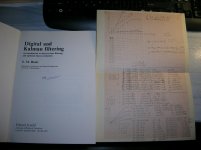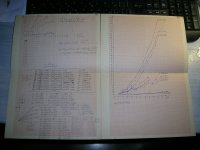I think the issue is what happens to noise in a feedback loop. Does global feedback reduce noise? If the feedback is reducing signal level as it should, does this result in a lower signal to noise ratio?
However I think there is some of the cat chasing tail properties being assigned here. If you have noise in the output of a global feedback amplifier is this noise amplified by the open loop gain....
Vac,
The Leprechaun Protective League might just want to talk to you about a defamation action. It is the fairies that chase the rabbits!
However I think there is some of the cat chasing tail properties being assigned here. If you have noise in the output of a global feedback amplifier is this noise amplified by the open loop gain....
Vac,
The Leprechaun Protective League might just want to talk to you about a defamation action. It is the fairies that chase the rabbits!
Last edited:
Pure tones emerge relatively unscathed, but noise is logarithmically enlarged.
I appreciate the thought but you are invoking the demon again. The noise doesn't go round and round either.
Last edited:
Max,
As just a thought process I am trying to see your argument. It sounds like you are saying that the noise component would be multiplied in a ratio that would be different than the other part of the spectrum, meaning that the noise would be increased disproportionately to the music signal? The noise at the mic is mixed into the signal but is not a separate entity after that point so I don't follow how you can say what you are?
As just a thought process I am trying to see your argument. It sounds like you are saying that the noise component would be multiplied in a ratio that would be different than the other part of the spectrum, meaning that the noise would be increased disproportionately to the music signal? The noise at the mic is mixed into the signal but is not a separate entity after that point so I don't follow how you can say what you are?
Read it ten times.
Recursive (feedback) systems introduce an extra layer of modulation (intermodulation) of the signal (and embedded noise).
Pure tones emerge relatively unscathed, but noise is logarithmically enlarged.
IOW due to time delays/phase skewing in recursive systems noise cannot be perfectly controlled/cancelled and is in fact dynamically magnified.
Dan.
Dan, with recursive systems, the higher the recursive factor, the more the system acts as a low pass filter, consequently rejecting noise.
George
Attachments
Max,
As just a thought process I am trying to see your argument. It sounds like you are saying that the noise component would be multiplied in a ratio that would be different than the other part of the spectrum, meaning that the noise would be increased disproportionately to the music signal? The noise at the mic is mixed into the signal but is not a separate entity after that point so I don't follow how you can say what you are?
Second Law violation.
Max and Kind, interesting inputs. Unfortunately, they are not well proved out, but I'm sure that there is something to it, just like you have put forth.
So they didn't cover basic thermodynamics when you were in school?
I will get my hands on a mini-dsp and see how much I can screw things up! I've built some nice oscillating networks in analog before, why not blow something up digitally
There will be no blood on the floor, no smoke in the air. (*)
Go ahead
George
(*) and this is exactly what I don’t like with this platform.
Recommended reading
Chapter 10, Noise in Feedback Circuits, pp. 262-287, in van der Ziel, Noise, Prentice-Hall, 1954, or the three papers by Strutt and van der Ziel in Physica from the early 1940's.
Cherry and Hooper, Amplifying Devices and Low-Pass Amplifier Design, chapter 10, Introduction to Negative Feedback Theory, Section 10.8, Noise, pp. 526-528. Very short discussion from which I quote:
"Thus for series-input series-output feedback, the noise generators at the input are the noise generators of the forward path. The same conclusion applies to all other configurations, and ideally feedback has no effect on the noise performance of any amplifier. In practice this conclusion can be invalidated in either of two ways:
1. If |A sub lm| is large so that the closed-loop transfer function is small, noise from subsequent stages in the amplifier may be significant. In other words, the principle that feedback does not change the noise performance is true only when the feedback loop encloses all significant sources of noise.
2. In almost all practical amplifiers the feedback network contains resistors that contribute thermal noise.
Practical applications of these general principles are given in Sections 11.4 and 14.1.2. "
Chapter 10, Noise in Feedback Circuits, pp. 262-287, in van der Ziel, Noise, Prentice-Hall, 1954, or the three papers by Strutt and van der Ziel in Physica from the early 1940's.
Cherry and Hooper, Amplifying Devices and Low-Pass Amplifier Design, chapter 10, Introduction to Negative Feedback Theory, Section 10.8, Noise, pp. 526-528. Very short discussion from which I quote:
"Thus for series-input series-output feedback, the noise generators at the input are the noise generators of the forward path. The same conclusion applies to all other configurations, and ideally feedback has no effect on the noise performance of any amplifier. In practice this conclusion can be invalidated in either of two ways:
1. If |A sub lm| is large so that the closed-loop transfer function is small, noise from subsequent stages in the amplifier may be significant. In other words, the principle that feedback does not change the noise performance is true only when the feedback loop encloses all significant sources of noise.
2. In almost all practical amplifiers the feedback network contains resistors that contribute thermal noise.
Practical applications of these general principles are given in Sections 11.4 and 14.1.2. "
Read it ten times.
There is no such thing as a noise free microphone generated signal, therefore music contains embedded circuit noise.
Circuit intrinsic noise is modulated by instantaneous signal level which includes preceding stage noise.
Recursive (feedback) systems introduce an extra layer of modulation (intermodulation) of the signal (and embedded noise).
Pure tones emerge relatively unscathed, but noise is logarithmically enlarged.
IOW due to time delays/phase skewing in recursive systems noise cannot be perfectly controlled/cancelled and is in fact dynamically magnified.
Dan.
And then, somewhere in there, its just an/one envelope.
//
I took upper division thermodynamics back in 1963. Can't remember anything that would tell me that feedback looping was impossible. Same with Bybee purifiers.
So it didn't stick with you?
If you want to figure out why this claim is ridiculous, see if you can find literature on Maxwell's Demon. Work your way up to entropy.
One of the real problems here is what is called Xtalk (in 12 step programs) that stifles open opinions.
If you say something that's incorrect, especially when promoting your business partners, people who know better will call you on it.
Well I know I am not the one to discuss this at the level of Sy or Scott but I'll try and see if I can say something that makes some sense. If you look at this as a somewhat discrete function where the feedback goes around one time with a given signal for comparative and corrective action you would not think that it could be a logarithmic or exponential function in a feedback loop. Now if you think of this as an infinite series of feedback loops adding together you would think you would get something that had little to no relationship to the original signal. If that was the case I would think that all the small local feedback loops such as around a series of op-amps would also cause massive changes in the signal, that after three such loops in series the end result would have nothing to do with the original signal. Not sure if this reads in anyway correctly but the concept of endless looping seems impossible in effect if the signal would have any integrity to the original event.
George,
Would you go with the mini-dsp or the mini-sharc if it wasn't cost related to play with. I am only asking as I was thinking of going in the direction of FIR filtering rather than the IIR filtering of the mini-dsp? Twice the cost of course but it doesn't seem like a lot for a good learning tool.
Would you go with the mini-dsp or the mini-sharc if it wasn't cost related to play with. I am only asking as I was thinking of going in the direction of FIR filtering rather than the IIR filtering of the mini-dsp? Twice the cost of course but it doesn't seem like a lot for a good learning tool.
1. If |A sub lm| is large so that the closed-loop transfer function is small, noise from subsequent stages in the amplifier may be significant. In other words, the principle that feedback does not change the noise performance is true only when the feedback loop encloses all significant sources of noise.
Which just seems like another way of saying that noise generated in the input stage is not reduced by the feedback loop either. Nor is noise generated by the current mirror, if your LTP uses one.
I see no reason to think that the noise of each stage in a feedback loop is not divided by the total gain of the preceding stages.
- Status
- Not open for further replies.
- Home
- Member Areas
- The Lounge
- John Curl's Blowtorch preamplifier part II

